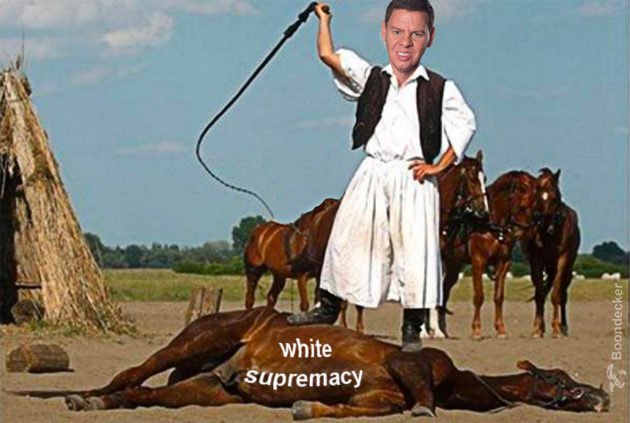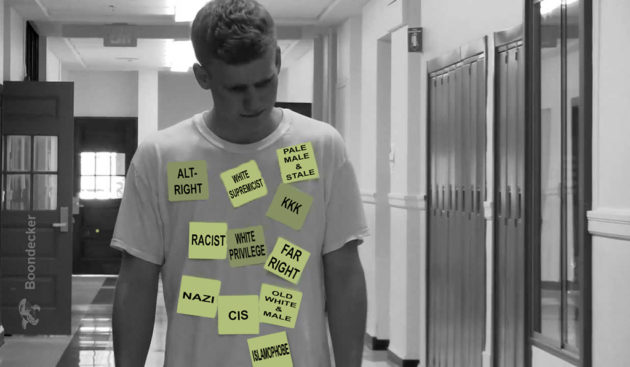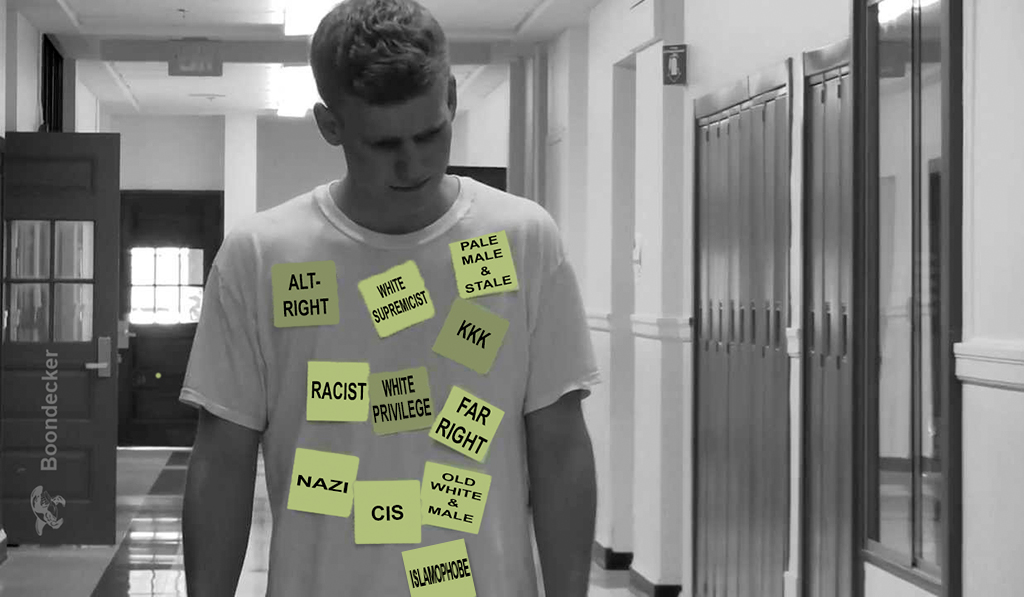A moral panic is the phenomenon of widespread fear of a threat to the values, interests or well-being of the community. It is usually originated by moral entrepreneurs, people or entities who appoint themselves the moral fabric of a community and society. Famous examples of this include the Salem Witch Trials, the Satanic Ritual Abuse panic and the McCarthyist Red Scare of the 50s. However, in talking about the last point, it’s interesting how the same media who used to mock the ‘Reds Under Your Beds’ scare now panic about Russian interference.
I see the same now happening with ‘white supremacists’. This is a moral panic from our moral entrepreneurs in the media, academia and the political establishment. Of course, this shouldn’t be a surprise. Because they are seen as our ‘experts’ they are meant to tell us what we should be concerned about. However, this was under the assumption that these concerns and solutions would be subject to debate, scrutiny and analysis in order to come to a pragmatic answer to the questions of our world. It seems this is no longer the case. Now we are expected to trust the ‘science’ even though science is a process of questioning and reexamining to ensure that the conventional wisdom is consistent with our observations of the natural world. We see this with climate change and now we see this with white supremacy.
Of course, this fear happened before March 15th. After the shock events of Trump’s election and Brexit, our moral entrepreneurs in the media and academia suddenly began discussing the rise of the ‘far right’ and how populism and nationalism were a threat to democracy. This is despite the fact that populists and nationalists often want to preserve and protect the democratic institutions and checks and balances on government power. Populism only happens when there is too much government overreach, especially when powers are given to unelected technocrats with no accountability. Especially when elected politicians and the media defend these technocrats.

In 2018, that was the big concern that the media talked about. I’m sure many of you here remember seeing ‘far right militia growing’ or ‘white nationalist group marches’ or ‘far right speaker/figure to speak at such and such a place’. Much of this was directed against the Trump movement in America, the Brexiteers of England and other Eurosceptic movements. A specific target of this was Eastern Europe, including Poland, Hungary, Czechia and Slovakia. Some of you may have forgotten that this also included Ukraine.
Of course, this has escalated post the Christchurch shootings. The response from our police and intelligence services was quite extensive. Their first action was to search the homes and question about 200 New Zealand citizens, including interrogating these citizens on their political beliefs. They then were granted, or assumed, powers including arbitrary identification of terrorist groups, seizure of firearms with increasingly stringent gun control laws, increased surveillance, and regulation of social media content.
This is in response to a small minority of individuals. Pew Research polls continually show an increase in support for interracial relationships and a decrease in racist attitudes. In fact, the mainstream media even had to admit that many of the ‘far right’ groups they were tracking were small.
The question we shouldn’t be asking is how does this ‘extremist’ content spread and how do people get access to it?
The question we should be asking is why does this content become attractive?
If it were racist, white supremacist and hateful as the political class would have us believe, logic dictates that most people would have clicked off. The other question that should be asked is why would young people willingly join these groups if they are so dangerous?
There are a number of reasons. One is disenfranchisement. This has been suggested as a possible reason for young people joining criminal gangs. Disenfranchisement happens as a result of economic instability which could be caused by inflation, wage deflation or loss of investment.
Another possible reason is a loss of identity, as without identity there is no security, so some people look for that security in a group. This seems true in Europe where more and more youth are joining the identitarian movements there such as Generation Identity. European youth are attracted to several kinds of such identities. One is based on the Christian European identity; another, becoming more popular in Scandinavian countries, on Norse and Viking culture. Another, more popular in France and Germany, is based on secular rationalism. This is also coupled with what is known as the ‘clash of civilisations’ thesis, in which the next conflicts are based on values rather than geography or natural resources. While this has been applied to international relations, this can be applied to the current culture war happening within Europe.
Whatever the case, this rise in white identity movements shouldn’t be a surprise. When you tell white people how evil they are and continually blame them for societal problems, they will either cave in and become apologetic or react in more radical ways. The Maori would understand this best since they experienced an identity crisis after the government and Apirana Ngata’s generation tried to change their culture towards the dominant European culture. Now we see Maori identitarian movements forming for the Maori youth to rediscover their roots.

So why are Maori allowed to do this and celebrate the good things about their culture but Europeans are not?
These white identitarian movements should not be feared. They are different from the imperialist movements of the 20th Century. All they want is the right to be able to explore their own identity and culture without being consistently demonised.
What they do is no different from any other ethnic group exploring and preserving who they are. The respect that Maori are demanding from the Pakeha can be granted if they reciprocate with this same respect to everyone else.

